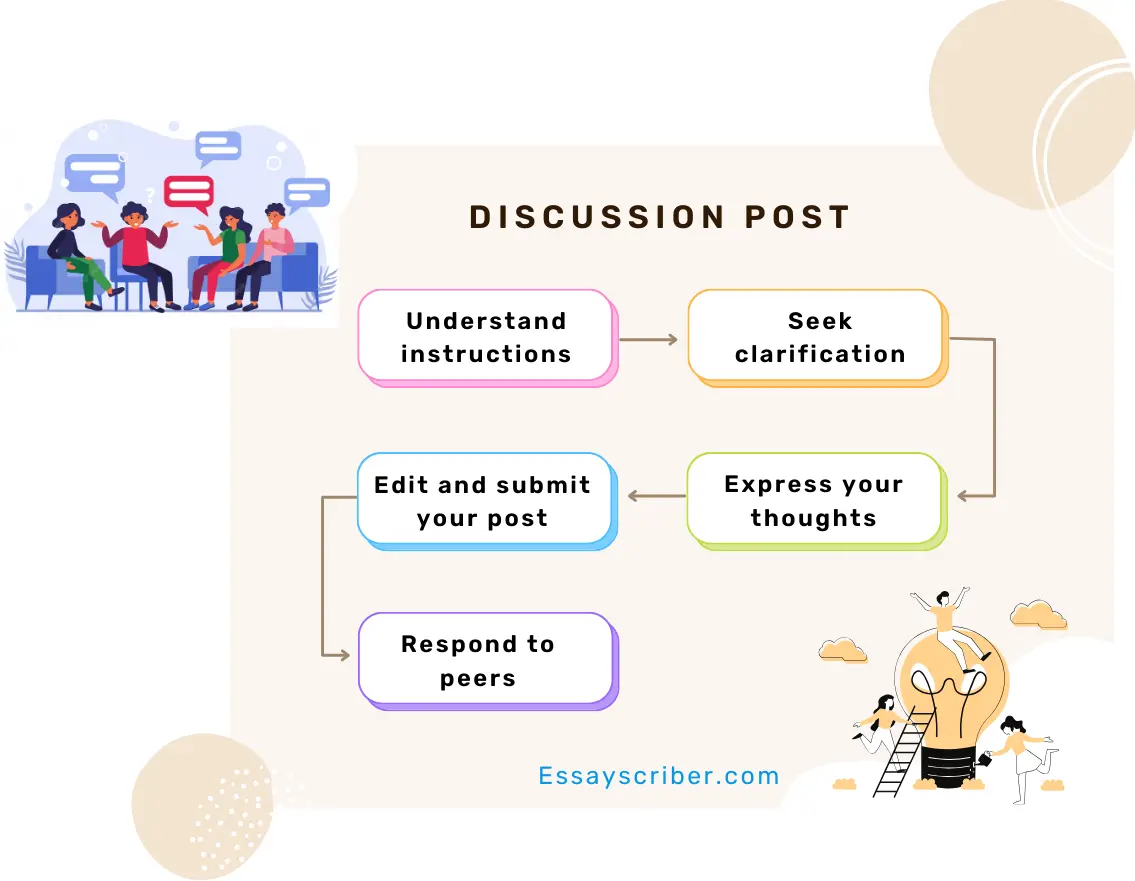What is a Discussion Board Post?
A Discussion Board Post is a written contribution you make in an online class forum. It’s like a virtual classroom where you share your thoughts and ideas about a specific topic or question posed by your teacher. These posts encourage discussion, critical thinking, and interaction with your classmates in an asynchronous, text-based format.
A discussion post is necessary because it allows you to actively engage with the course material, demonstrating your understanding and critical thinking skills. Indeed, it is part of your coursework writing. It fosters interaction with peers, facilitating collaborative learning and the exchange of diverse perspectives. Additionally, it provides valuable feedback to both you and your instructor, helping to clarify concepts and assess your comprehension.
| Key Steps for a Successful Discussion Post |
|---|
| Read and understand the instructions before you start to write. |
| Ask questions: Your tutors are usually available to answer any questions you have about the discussion post. |
| Use the discussion forum to express your thoughts on a topic. |
| Ensure that you restrain yourself to the discussion topic and avoid veering off. |
| Do not procrastinate. Although discussion posts are short, they contribute to your overall score in a course. |
| Review and edit your discussion post before posting it to ensure it is clear and free of common mistakes. |
| Offer meaningful insights to your peers, as this is a learning experience. |
| Use citations to support any arguments you make in your discussion post. |
How to get started on writing a strong discussion post

Understand the Prompt
Understanding the discussion prompt is the foundation of a well-crafted post. Take the time to analyze the question or topic, break it down into its key components, and consider any specific instructions provided by your instructor. This thorough understanding will guide the direction of your response and ensure you address the core issues raised in the prompt.
Refer to the Scoring Rubric
Utilizing the scoring rubric is a valuable strategy for achieving a high-quality discussion post. By referring to the rubric, you gain insights into the criteria your instructor will use to evaluate your post. This enables you to tailor your response to meet those expectations, enhancing your chances of scoring well in the discussion.
Present Evidence and Examples
A compelling discussion post often hinges on the use of evidence and examples to support your arguments or ideas. Drawing from course materials, textbooks, or credible external sources, provide concrete examples, statistics, or quotations to bolster your claims. This not only adds depth to your response but also demonstrates your engagement with the subject matter.
Draft the Answer Before Posting
Rushing to post your response can lead to oversights and unclear communication. Instead, draft your answer in a separate document or within the discussion platform itself. This allows you to carefully construct and refine your thoughts, ensuring a well-organized and articulate post that effectively communicates your ideas to your peers.
Express Yourself Clearly
Clarity in communication is vital in a discussion post. Use concise and precise language to express your thoughts. Avoid jargon or overly complex terminology that might confuse your audience. Organize your ideas logically, with a clear introduction, body, and conclusion, making it easier for others to follow your line of reasoning.
Take Your Grade to the Next Level
- Plagiarism Free
- Grammatical
- Timely delivery
- 24/7 Support
Responding to Discussion Posts
Respond Promptly
Engaging in discussions requires active participation. Posting your initial response early in the discussion period allows ample time for your peers to respond to your ideas and for you to engage in meaningful back-and-forth exchanges. Prompt responses not only contribute to the overall quality of the discussion but also demonstrate your commitment to the learning process.
Be Respectful
Maintain a courteous and respectful tone in your responses, even when you disagree with others. Constructive criticism and polite language foster a positive learning atmosphere.
Make it Meaningful
Ensure your responses contribute to the discussion’s depth and relevance. Avoid one-word replies and instead provide thoughtful insights, analysis, or personal experiences that enhance the conversation.
Write in Context
Keep your responses relevant to the original post or the ongoing discussion thread. Stay on-topic, and reference or quote relevant portions of the original post to provide context for your response.
Ask Questions
Encourage further discussion and engagement by asking questions that invite your peers to share their perspectives or elaborate on their ideas. This fosters interactive and dynamic exchanges within the discussion forum.
Final touches
- Citing Sources: Always cite your sources when using external information, following the citation style specified by your instructor. This ensures academic integrity and acknowledges the original authors’ work.
- Mistakes to Avoid: Avoid common mistakes such as using informal language, posting off-topic content, or neglecting grammar and spelling. Keep your posts focused, respectful, and free from errors.
- Review and Revise: Before submitting, review your post for clarity, coherence, and conciseness. Edit for grammar and spelling errors, ensuring your message is well-structured and easy to understand.
- Submit: Finally, submit your post within the specified timeframe to actively participate in the discussion. Procrastination can hinder meaningful interactions, so aim to contribute early when possible.
You may also want to learn how to write an essay to improve your grades here, or have us help you with your assignment.

